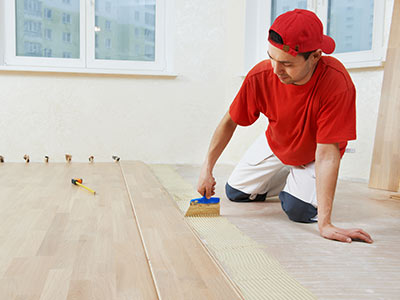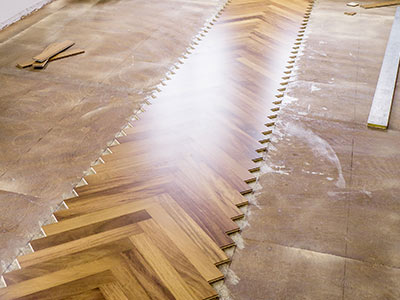Back to Wood Floor Fitting
Ultimate Guide to Wood Floor Glue Installation - Part One
 There are 3 main methods of wood floor installation and gluing the wooden floorboards down is one of them and certainly one of the more popular and commonly chosen ways to have a wooden floor fitted. The overall aim of the wood floor installation process is to create a stable, structurally solid and durable construction of wooden floorboards that can last for many years and don’t experience serious structural issues even in cases of excessive use and really high traffic.
There are 3 main methods of wood floor installation and gluing the wooden floorboards down is one of them and certainly one of the more popular and commonly chosen ways to have a wooden floor fitted. The overall aim of the wood floor installation process is to create a stable, structurally solid and durable construction of wooden floorboards that can last for many years and don’t experience serious structural issues even in cases of excessive use and really high traffic.
Gluing down installation is certainly providing you with a stable and durable wooden floor you will enjoy for decades. However, it is safe to say that this type of installation also involves a considerable amount of effort along with a professional, knowledgeable, and experienced approach, of course. The most important detail that will determine the following gluing installation is the type of wood floor adhesive that will be chosen for the project. In order to help you plan your wood floor gluing installation better and make the right decisions, today we provide you with more in-depth information on wood floor adhesives and how they work.
Pros and Cons of Glued Down Floor Installation
As you can tell by the name, wood floor adhesives are designed to make the wooden floorboards stick to the subfloor. In recent years and with the introduction of the floating wood floor installation, fitting the floor with adhesive is not that popular anymore. Indeed, floating installation is easier, faster, and usually more cost-effective, however, gluing down your floor comes with a lot of advantages and benefits too. A gluing down installation of the floor comes with the guarantee of a more durable, stable, long-lasting, and hard-wearing flooring structure under your feet. So if you want something more durable in the long term or the floor is installed in a high traffic area or at commercial premises, the recommendation is to choose a glued down wooden floor.
In addition, one of the other advantages of the glued down installation is that the floor can be sanded more easily because it is fixed to the subfloor with a strong adhesive. This type of flooring installation ensures the floor will be quieter and there won't be the annoying squeaky noise in future. The glued down wooden floor is also a good option for underfloor heating systems, because thanks to the adhesive, no air cushions are created between the subfloor and the wooden floorboards, which improves the thermal conductivity and makes the floor more energy- and cost-efficient that way. However, keep in mind that glued down floors are not that easy to remove and replacing the floor after time will be significantly difficult and require some considerable effort.
Wood Floor Adhesives on the Market
 In order to achieve optimal results for your glued down floor, you should make sure that the right type of adhesive is chosen for the fitting project. Not all types of adhesives are created equally and a little bit of research along with consultation with an experienced professional is the key to purchasing the right type and brand of adhesive. In addition, not all types of wood floor adhesive will be suitable for the particular type of floor you want to install. Therefore, whenever you decide to purchase wood floor adhesive, make sure that the product is suitable to the type of real wood floor you will have installed along with the substrate. The best way to make sure you are doing the right choice is by thoroughly checking the manufacturer’s instructions for installation and use and this will indicate whether the product is suitable for your project or not.
In order to achieve optimal results for your glued down floor, you should make sure that the right type of adhesive is chosen for the fitting project. Not all types of adhesives are created equally and a little bit of research along with consultation with an experienced professional is the key to purchasing the right type and brand of adhesive. In addition, not all types of wood floor adhesive will be suitable for the particular type of floor you want to install. Therefore, whenever you decide to purchase wood floor adhesive, make sure that the product is suitable to the type of real wood floor you will have installed along with the substrate. The best way to make sure you are doing the right choice is by thoroughly checking the manufacturer’s instructions for installation and use and this will indicate whether the product is suitable for your project or not.
Thanks to the continuous development and improvement in the industry, nowadays, wood floor adhesives come with significantly better quality, they are easier to use even by non-experienced or non-professionals and are safer for the health and nature. Most of the adhesive products you will find in the specialist shops are not only more user-friendly but also pass the eco-test and are equally harmless to humans and to nature. This is a pretty significant improvement given the fact that just a few years back, questionable and controversial components used to be used as ingredients of the majority of wood floor adhesives available on the market back then.
Types of Wood Floor Adhesives
The wood floor market offers a great variety of different wood floor adhesive types and brands and the one you are going to choose for the fitting project of your floor highly depends on a bunch of factors, including the individual specifics and requirements of the project, your budget, etc. However, if you want to learn more about wood floor adhesives, here are the main categories you will normally work with.
Silane-based Adhesives
This is considered the most innovative and modern type of wood floor adhesive. Silane-based adhesives are a hybrid form that mixes MS polymer or modified silane. This type of wood floor adhesives are solvent-, water-, and isocyanate-free and are moisture- and UV-resistant. In recent years, this type of wood floor adhesives gain more and more popularity and surely replace the old-fashioned solvent adhesives, which are not banned in many countries over the world.
One of the main specifics and a big advantage of silane-based adhesives is that they remain elastic and flexible even when fully cured, which ensures the floor has the corresponding scope and flexibility for shrinking and expanding without this natural process in response to moisture, humidity, and temperature fluctuations to cause serious issues with the floorboards or the structural integrity of the floor. Therefore, this type of wood floor adhesive is suitable for use with almost all types of real wood flooring as well as for use with the underfloor heating systems.
Reaction Resin Adhesives
Reaction resin adhesives are another category of wood floor adhesives that is generally acceptable for use and harmless. These types of adhesives are available as one-component PUR adhesives and two-component PUR adhesives. One-component PUR adhesives remain elastic and flexible after full curing, which ensures scope for the floor to shrink and expand without serious damage, which makes them also suitable for bonding of stress-bearing wooden floors and wooden floors in busy and high-traffic areas, while two-component PUR adhesives cure with no elasticity. Therefore, this type of reaction resin adhesives is mainly used for shear-resistant wood floor layering.
Dispersion Adhesives
One more widely used type of wood floor adhesives is dispersion adhesives that offer a shear-resistant bonding of solid wood flooring. This type of wood flooring adhesives is not elastic after full curing, which means they do not allow the floor a lot of scope or room to move after they are fully cured. Dispersion adhesives are mainly water-based with a low amount or no solvents.
Keep in mind that this type of wood floor adhesives are not that easy to use, working fast after application of the adhesive is necessary so you can utilise the properties of this type of adhesive optimally. Additionally, keep in mind that this type of wood floor adhesives are not suitable to areas of the house that may be subject to increased moisture and water content, since the water content in the adhesive itself may lead to additional increased expansion of the floorboards.
Powder Adhesives
This type of wood floor adhesive consists of plastic powder or plaster or cement added to various fillers. This type of wood floor adhesive is solvent-free. The powder should be mixed with water and the mixture you get in the result is suitable for usage and installation of low-stress and low-traffic wood floors, including mosaic and multi-layer, finished wood flooring.
Solvent-Based Adhesive
Despite the fact that the most modern and innovative adhesive products on the market are free of solvents, still, some solvent-based wood floor adhesives are available on the market. However, a solvent-based wood floor adhesive is not the best choice for any project and these should be used only as an exception and only for projects when the specific usage of these types of adhesives is necessary for some reason.